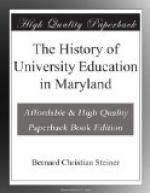Proceeding to speak of the Johns Hopkins University, the speaker then announced that at first the Faculty of Philosophy would alone be organized, where instruction would be given in language, mathematics, ethics, history and science. The Medical Faculty would not long be delayed. That of Jurisprudence would come in time. That of Theology is not now proposed.
The next paragraphs of the address will be given without abbreviation.
Who shall our teachers be?
This question the public has answered for us; for I believe there is scarcely a preeminent man of science or letters, at home or abroad, who has not received a popular nomination for the vacant professorships. Some of these candidates we shall certainly secure, and their names will be one by one made known. But I must tell you, in domestic confidence, that it is not an easy task to transplant a tree which is deeply rooted. It is especially hard to do so in our soil and climate. Though a migratory people, our college professors are fixtures. Such local college attachments are not known in Germany; and the promotions which are frequent in Germany are less thought of here. When we think of calling foreign teachers, we encounter other difficulties. Many are reluctant to cross the sea; and others are, by reason of their lack of acquaintance with our language and ways, unavailable. Besides we may as well admit that London, Paris, Leipsic, Berlin, and Vienna afford facilities for literary and scientific growth and influence, far beyond what our country affords. Hence, it is probable that among our own countrymen, our faculty will be chiefly found.
I wrote, not long ago, to an eminent physicist, presenting this problem in social mechanics, for which I asked his solution, “We cannot have a great university without great professors; we cannot get great professors till we have a great university: help us from the dilemma.” Let me tell his answer: “Your difficulty,” he says, “applies only to old men who are great; these you can rarely move; but the young men of genius, talent, learning and promise, you can draw. They should be your strength.”
The young Americans of talent and promise—there is our strength, and a noble company they are! We do not ask from what college, or what state, or what church they come; but what do they know, and what can they do, and what do they want to find out.
In the biographies of eminent scholars, it is curious to observe how many indicated in youth preeminent ability. Isaac Casaubon, whose name in the sixteenth century shed lustre on the learned circles of Geneva, Montpellier, Paris, London and Oxford, began as professor of Greek, at the age of twenty-two; and Heinsius, his Leyden contemporary, at eighteen. It was at the age of twenty-eight, that Linnaeus first published his Systema Naturae. Cuvier was appointed a professor in Paris at twenty-six, and, a few months later, a member of the Institute. James Kent,




